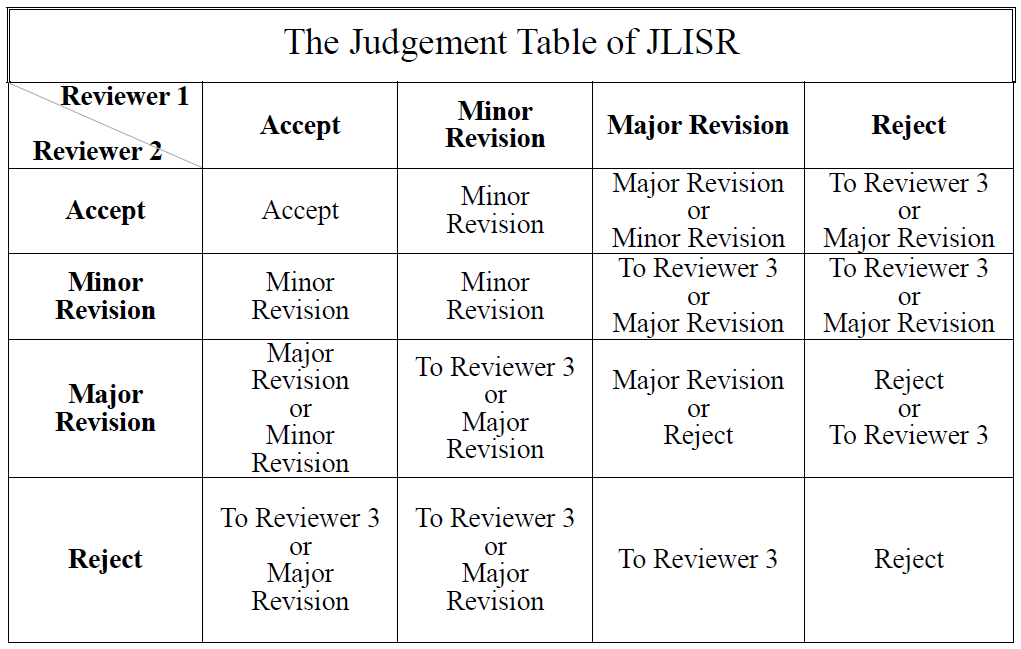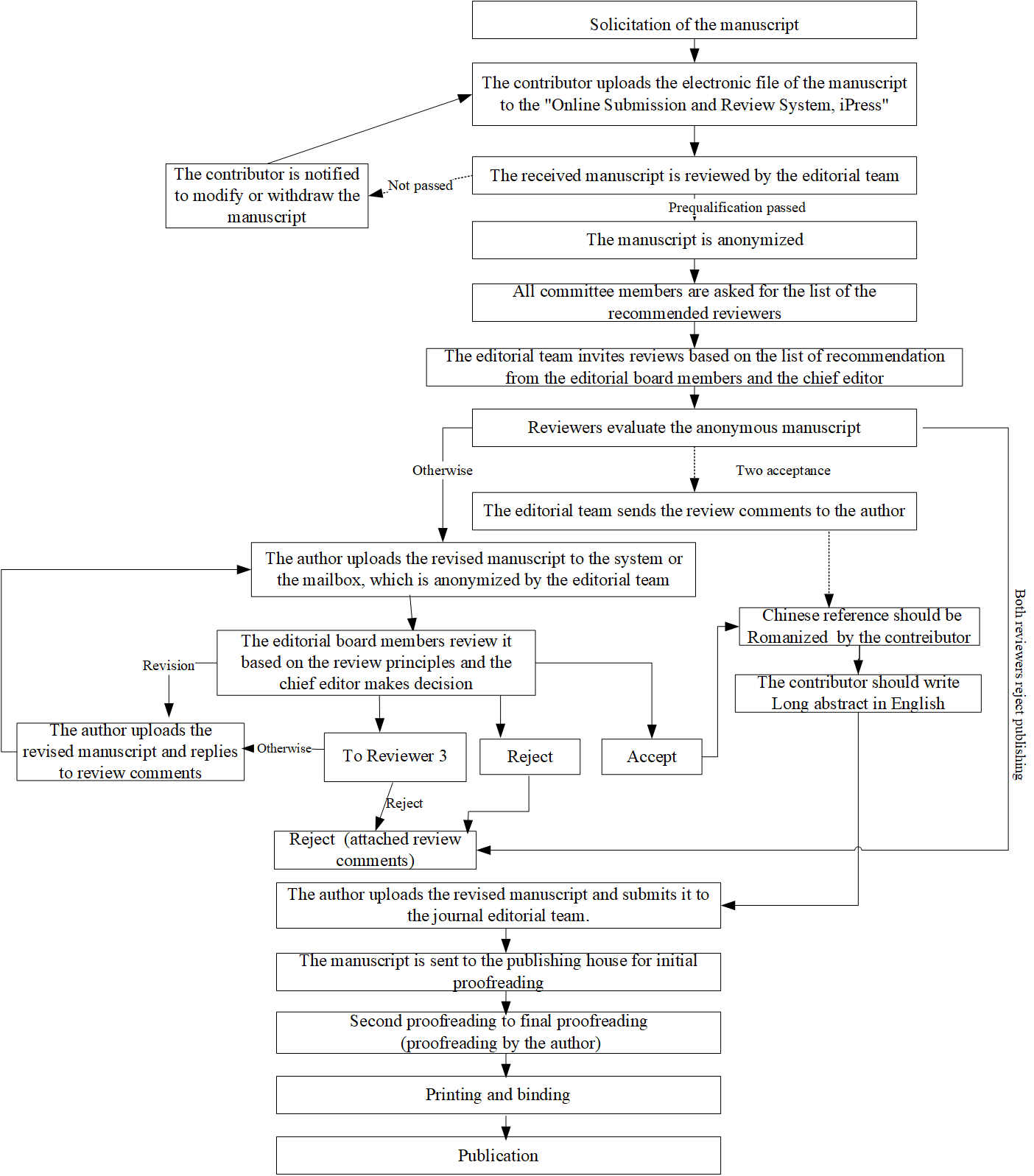I. About the JournalOverviewJournal of Library and Information Science ResearchThe Journal of Library and Information Science Research (JLISR, ISSN: 2218-3388), published semiannually by the Library Association of the Republic of China (Taiwan), is a leading journal for double blind peer-reviewed research in library and information science in Taiwan. Bulletin of the Library Association of China, which had served as a forum for its members since 1954, went through a structural transformation in 2005, at that time it was also renamed to enable further advance of LIS research in Taiwan. JLISR has been indexed and abstracted in Library and Information Science Abstracts (LISA) since 2008. After a vigorous review process by National Science and Technology Council in Taiwan (R.O.C.), it has been included in Taiwan Social Science Citation Index(TSSCI) since 2010. JLISR is an open access journal that does not charge readers or their institutions for access. Since 2014, the journal has also been indexed by EBSCO and its associated I&A services such as LLIS, H.W. Wilson, OALib, and also by LISTA through ProQuest. It has also been included in Ulrich’s Periodicals Directory. Citation index
Contact Information
SubscriptionII. Editorial BoardFormer EditorsMing-Der Wu Ting-Ming Lai Shan-Ju Lin Chang Ming-Yueh Tsay Chao-Chen Chen Kuang-Hua Chen I-Chin Wu Editorial StaffEditor-in-ChiefMuh-Chyun Tang Executive EditorLi-Min Cassandra Huang English Associate EditorMing-Hsin Chiu Assistant EditorsTzu-Yin Chen Advisory Board Christine L. Borgman Pertti Vakkari Shan-Ju Lin Chang Chao-Chen Chen Hsueh-Hua Chen Ling-Hwey Jeng Fiona Fui-Hoon Nah Editorial BoardHuvila, Isto Khoo Soo Guan, Christopher Dan Wu I-Chin Wu Professor, Graduate Institute of Library & Information Studies, Kazuaki Kishida Chiao-Min Lin Wen-Yau Cathy Lin Hao-Ren Ke Ya-Han Hu Rong Tang Kuang-Hua Chen Yuan-Ho Huang Nei-Ching Yeh Shiao-Feng Su Ying Sun III. Editorial PolicyAims and ScopeThe JLISR aims to provide a scholarly forum for all aspects of librarianship and information science. It publishes rigorous works that address issues in librarianship, information science, communication, information technology, documentation, and archive studies. As a leading scholarly journal in library and information science in Taiwan, JLISR aspires to broaden its international reputation. Beginning from 2011, an extended English abstract is required for all articles published by JLISR. We would also like to extend our welcome to English submissions from across the globe. Key journal audiences
Copyright and Licensing
Download Copyright License Agreement File Open Access PolicyOpen access policy: In the spirit of the Budapest Open Access Initiative (BOAI), this journal provides immediate open access to its content on the principle that making research freely available to the public supports a greater global exchange of knowledge. Authors of articles published remain the copyright holders and grant third parties the right to read, download, copy, distribute, print, search, or link to the full texts of these articles or link to the full texts of these articles, crawl them for indexing, pass them as data to software, or use them for any other lawful purpose according to the Creative Commons Attributions CC BY-NC under Creative Commons Attributions 4.0 Archiving policyArchiving policy: LAROC will also have the right to digitally archive the publication and provide immediate open access to its content via the Journal website. Each accepted manuscript is assigned a Digital Object Identifier (DOI). All metadata is openly available for harvesting by indexing services via OAI-PMH and journals are registered with Open Archives. In particular, the different versions of the accepted manuscripts, including submitted, accepted, and published versions, are deposited within the database of the submission system of JLISR. The published version of the accepted manuscripts is also deposited on the JLISR website maintained by LAROC. The digital files of JLISR articles have been simultaneously created a repository with the National Central Library’s “Taiwan Periodical Literature” database (https://tpl.ncl.edu.tw/NclService/JournalQuery). Additionally, the authors are free to deposit all versions of their manuscripts in an institutional or other repository of their choice. However, it is our expectation that authors should be aware of the followings:
IV. Submission Guideline and Online SubmissionAuthor Guideline
Reference StyleAll manuscripts should follow the 6th edition of the Publication Manual of the American Psychological Association (APA). Authors should ensure that there is no infringement of others' copyrights and should obtain copyright clearance for any copyrighted material used in their manuscripts. Document of Extended AbstractV. Academic and Publication EthicsJournal of Library and Information Science Research (JLISR, ISSN: 2218-3388), published semiannually by the Library Association of the Republic of China (Taiwan), is a leading journal for double blind peer-reviewed research in library and information science in Taiwan. JLISR is committed to ensuring ethics in publication and quality of articles based on the Code of Conduct of the Committee on Publication Ethics (COPE), and aim to adhere to its Best Practice Guidelines. Conformance to standards of ethical behavior is therefore expected of all parties involved: Authors, Editors, Reviewers, and the Publisher. In particular, Duties of Editors: Editors should evaluate manuscripts exclusively on the basis of their academic merit. An editor must not use unpublished information in the editor’s own research without the express written consent of the author. Editors should take reasonable responsive measures when ethical complaints have been presented concerning a submitted manuscript or published paper. Duties of Reviewers: Any manuscripts received for review must be treated as confidential documents. Privileged information or ideas obtained through peer review must be kept confidential and not used for personal advantage. Reviews should be conducted objectively, and observations should be formulated clearly with supporting arguments, so that authors can use them for improving the paper. Any selected referee who feels unqualified to review the research reported in a manuscript or knows that its prompt review will be impossible should notify the editor and excuse himself from the review process. Reviewers should not consider manuscripts in which they have conflicts of interest resulting from competitive, collaborative, or other relationships or connections with any of the authors, companies, or institutions connected to the papers.
Duties of Authors: Authors should present an objective discussion of the significance of research work as well as sufficient detail and references to permit others to replicate the experiments. Fraudulent or knowingly inaccurate statements constitute unethical behavior and are unacceptable. Review articles should also be objective, comprehensive, and accurate accounts of the state of the art. The authors should ensure that their work is entirely original works, and if the work and/or words of others have been used, this has been appropriately acknowledged. Plagiarism in all its forms constitutes unethical publishing behavior and is unacceptable. Submitting the same manuscript to more than one journal concurrently constitutes unethical publishing behavior and is unacceptable. Authors should not submit articles describing essentially the same research to more than one journal. The corresponding author should ensure that there is a full consensus of all co-authors in approving the final version of the paper and its submission for publication. VI. Online SubmissionsPlease use the online submission system for manuscript submission (https://www.ipress.tw/J0198). All correspondence should be directed to: jlisr.taiwan@gmail.com.
The Editor-in-Chief of the JLISR invites editorial board members to recommend reviewers. The Editor-in-Chief select the reviewers based on the suggestion of the editorial board members who are relevant to the field of the manuscript and also seek experts in the relevant field who are from the Ad hoc members. The manuscript is reviewed by two to three reviewers, in a double-blind review system. The detailed review process and the reviewers' results are as follows. The Judgement Table of JLISR
JLISR iPress Submission and Review Flowchart
VIII. Formant and Agreement
|
I. Overview |
| II. Editorial Board | |
| III. Editorial Policy | |
| IV. Submission Guideline | |
| V. Academic and Publication Ethics | |
| VI. Online Submissions | |
| VII. Peer Review and Editoral Process | |
| VIII. Format and Agreement | |
| 附加檔案 | 大小 |
|---|---|
| 163.5 KB |


